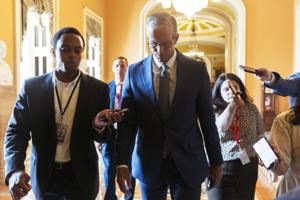Vice President JD Vance made a notable appearance at the Capitol early this morning as the Senate endured a tense overnight session. The focus of this marathon meeting was President Donald Trump’s ambitious fiscal bill, which proposes significant tax breaks alongside sweeping spending cuts. Republican leaders are actively seeking strategies to secure the necessary support to pass this contentious legislation.
The bill, which has been a cornerstone of Trump’s economic agenda, aims to stimulate growth by reducing the tax burden on businesses and individuals. However, it also includes deep cuts to social programs, sparking intense debate among lawmakers. As the session dragged on into the early hours, the atmosphere in the Senate was charged with urgency and tension.
Republican Leaders Strive for Consensus
The push to pass the bill has seen Republican leaders working tirelessly to unify their ranks. With a slim majority, every vote counts, and dissent within the party could derail the bill’s progress. Vice President Vance’s presence underscores the administration’s commitment to seeing the bill through, emphasizing its importance to Trump’s policy objectives.
According to sources within the Senate, several GOP senators remain undecided, citing concerns over the potential impact on the national deficit and the cuts to social welfare programs. The leadership is reportedly offering amendments and concessions to sway these holdouts.
Historical Context and Economic Implications
This legislative push echoes past efforts by Republican administrations to enact major tax reforms. The most notable parallel is the Tax Reform Act of 1986 under President Ronald Reagan, which similarly sought to simplify the tax code and reduce rates. However, the current bill’s combination of tax cuts and spending reductions presents a unique challenge.
Economists are divided on the potential outcomes. Some argue that the tax cuts could spur investment and job creation, while others warn that the spending cuts could undermine social safety nets and increase inequality. The Congressional Budget Office has yet to release a full analysis, but preliminary estimates suggest a significant increase in the deficit if the bill passes in its current form.
“The proposed cuts to social programs could have far-reaching effects on the most vulnerable populations,” said Dr. Emily Carter, an economist at Georgetown University. “While tax cuts may boost economic activity, the trade-offs must be carefully considered.”
Democratic Opposition and Public Reaction
Meanwhile, Democratic senators are unified in their opposition, arguing that the bill disproportionately benefits the wealthy and corporations at the expense of middle and lower-income Americans. They have vowed to use every procedural tool available to delay or block the bill’s passage.
Public reaction has been mixed, with protests erupting outside the Capitol as advocacy groups voice their concerns over the proposed cuts. Polls indicate a divided electorate, with support largely split along partisan lines.
Looking Ahead: The Path to Passage
The next steps for the bill remain uncertain. Republican leaders are hopeful that a vote could occur within the coming days, but much depends on their ability to secure the necessary support. The outcome of this legislative battle will likely have significant implications for the 2024 election cycle, as both parties prepare to leverage the bill’s success or failure in their campaigns.
As the Senate reconvenes later today, all eyes will be on the undecided senators whose votes could determine the fate of Trump’s fiscal ambitions. The nation watches closely, aware that the decisions made in these halls could shape the economic landscape for years to come.
